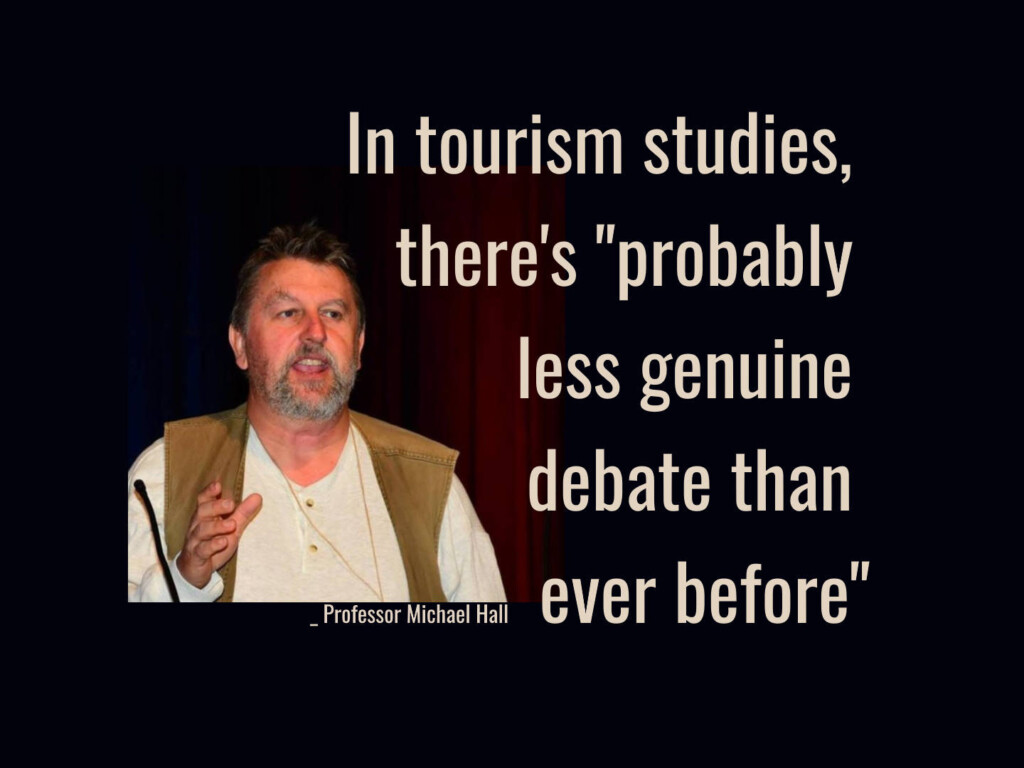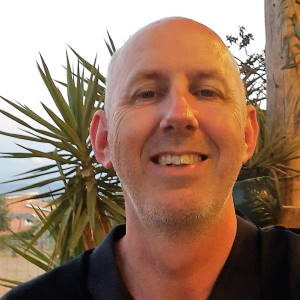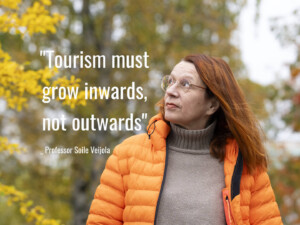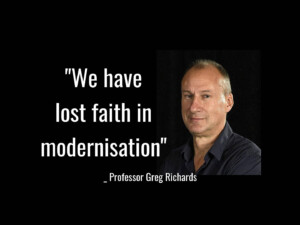Prof Michael Hall on inspirations, fears, and tourism studies’ legitimacy problem

There is much to fear about the future of travel, according to Michael Hall, including the risks that attend its growth, and the rise of intolerance. He also worries about a lack of “genuine debate” in tourism studies.
Professor Hall participated in a Tourism’s Horizon Interview. For this “Good Tourism” Insight, Jim Butcher summarises the highlights. [The full transcript is on Substack.]
Contents
Who is Professor Michael Hall?
Michael Hall is possibly the world’s most prolific academic authority on tourism. He plies his professorial trade in New Zealand, at the University of Canterbury.
Before his family emigrated to Australia from the UK, Michael started out life, and leisure, in the iconic UK resort of Margate; a place I know very well as a resident of Canterbury (UK) just 25 km away from Margate.
Hall shares with us snippets of an early life that perhaps shaped his interest in tourism:
“I grew up in the industry, maybe without realising it. My grandfather’s printing firm printed the posters for Dreamland and the Winter Garden in Margate. My mother had a B&B and my stepfather drove taxis. I worked in hospitality and did catering at university.”
As a child, Michael would get fish and chips from the Emin’s family restaurant/café. His stepfather’s taxi business was a block away.
UK readers may know that the name ‘Emin’ is now synonymous with Margate. The artist Tracy Emin has a long association with her hometown, and has just bought the historic Loggia seafront building which she intends to run as a community facility.
Inspired by ecology and geography
If he hadn’t become an academic, Professor Hall sees himself as “either an environmental activist or a cook; maybe both”.
His academic inspirations come less from ‘tourism studies’ and more from writings in ecology and geography (the field of his PhD) that captured his imagination.
He cites a 1973 National Geographic article on John Muir as a starting point for his interests in conservation, and subsequently tourism. Coincidentally Muir, too, left the UK (Dunbar on the Scottish east coast) as a boy, in his case for the USA.
Muir was a conservationist, famed for his role in the formation of the USA’s great national parks in the late nineteenth century. He also founded the Sierra Club, a US-based environmentalist membership organisation.
Muir was a Romantic. He believed that a connection with nature was intrinsic to our humanity, and that modern development was undermining the link. I suspect Professor Hall would happily accept any association with Muir’s sentiments.
Another influence on Hall is Marxist geographer David Harvey.
Harvey’s analysis of how the historical development of capitalism has shaped the life of the majority in cities extends to looking at how tourism real estate shapes culture and society in cities such as Barcelona.
Harvey is a great example of a truly deep thinker and theoretician who, arguably, sheds more light upon tourism than we might get from ‘tourism’ focused sources.
Don’t miss other “Good Tourism” Insight Interviews
Doubts about tourism studies
Professor Hall is not short of opinions on the state of tourism research and knowledge.
He bemoans the lack of a “distinctive sociology of tourism knowledge”. Tourism has yet to become “a legitimate field of study in its own right; like migration studies”.
Perhaps more worryingly, Hall believes that despite the exponential growth of published work, and of various newly declared ‘fields’ and ‘turns’, there is “probably less genuine debate than ever before”.
It’s a notable observation given the widespread perception that these are especially troubled times for mass tourism.
Don’t miss other “GT” content tagged ‘education and training’
‘Carrying capacity’ more useful than ‘overtourism’
We asked Professor Hall about the fashion for seeing tourism’s issues through the prism of ‘overtourism’. He suggests that carrying capacity was, and is, more useful.
Overtourism has encouraged “techo-rational solutions [that] do not deal with the underlying issues of consumption, contestation for space, and justice”.
One does not have to share Hall’s view on the nature of the problem or the prospective solutions to see that the issues are deep-rooted in the organisation of our society.
Perhaps we focus too much on the question of ‘which policy’ rather than ‘whose policy’? How democratic is the process of getting to it? (Democratic engagement with development is an issue highlighted by David Harvey.)
Don’t miss other “GT” content tagged ‘carrying capacity’
Much to fear
There is a pessimism running through his interview, a mood shared by many who are considering tourism’s role in our futures. For Professor Hall, there is much to fear:
He views the growth of travel with trepidation, and feels that in terms of mitigating climate change, we may already be “too late”.
He fears the rise of a generalised intolerance; not a ‘tourism’ issue, but certainly one that would affect tourism.
And, in the aftermath of COVID-19, he fears that “high-speed mobility and humanity’s destruction of nature now make [pandemics] more likely and impactful”.
Are his fears justified?
There are counterpoints:
- We are on the cusp of a renewable and nuclear energy informed future that holds out the prospect of a low emissions;
- Opinion polls indicate that most societies have become more tolerant and accepting of others over Hall’s lifetime, and;
- Modern medicine and science have led to a drastic decline in deaths from infectious diseases.
Hall writes from the heart and with great authority in this interview. There is much food for thought here.
We hope that this interview, and the other Tourism’s Horizon Interviews, will prompt the very thing Hall identified as lacking; serious debate on the future of tourism and what it means to be a tourist.
What do you think?
Share your own thoughts in a comment below. (SIGN IN or REGISTER first. After signing in you will need to refresh this page to see the comments section.)
Or write a “GT” Insight or “GT” Insight Bite of your own. The “Good Tourism” Blog welcomes diversity of opinion and perspective about travel & tourism, because travel & tourism is everyone’s business.
“GT” doesn’t judge. “GT” publishes. “GT” is where free thought travels.
If you think the tourism media landscape is better with “GT” in it, then please …
About the author

Jim Butcher is a lecturer, and the writer of a number of books on the sociology and politics of tourism. Dr Butcher blogs at Politics of Tourism, tweets at @jimbutcher2, and initiated Tourism’s Horizon: Travel for the Millions (a “GT” Partner) on Substack.
About the Tourism’s Horizon Interviews
“Good Tourism” Insight Partner Tourism’s Horizon: Travel for the Millions, in collaboration with “GT”, has sought the candid views of well-known and respected experts on tourism’s past, present, and future.
The Tourism’s Horizon Interviews involves Jim Butcher, Vilhelmiina Vainikka, Peter Smith, Saverio Francesco Bertolucci, David Jarratt, and Sudipta Sarkar as interviewers. The “Good Tourism” Blog will publish their highlights and commentary as “GT” Insights.
Read the full transcripts of each interview on Tourism’s Horizon’s substack.
Featured image (top of post)
Professor Michael Hall (pictured) reckons there’s “probably less genuine debate than ever before” in tourism studies.



![Prof Michael Hall on inspirations, fears, and tourism studies' legitimacy problem 4 Professor Valeria Minghetti: "[B]e curious. Never stop asking yourself questions. Curiosity and the desire to find solutions is what makes a difference ..."](https://www.goodtourismblog.com/wp-content/uploads/2024/05/Professor-Valeria-Minghetti-300x225.jpg)

![Prof Michael Hall on inspirations, fears, and tourism studies' legitimacy problem 6 Professor Richard Butler on tourism’s challenges and academia’s inadequacies ... "[Don't] let wishful thinking take precedence over logic"](https://www.goodtourismblog.com/wp-content/uploads/2023/12/Prof-Richard-Butler-on-tourisms-challenges-and-academias-inadequacies-300x225.jpg)
